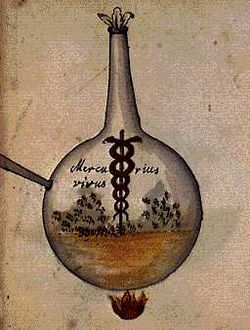Mercury process: Difference between revisions
(Created page with "File:Mercurius CABALA MINERALIS.jpg|thumb|250px|Our Mercurius, the bridging water of life (''Mercurius noster. Aqua viva pontica.'')<br>Source: [https://www.alchemywebsite.c...") |
No edit summary |
||
| Line 1: | Line 1: | ||
[[File:Mercurius CABALA MINERALIS.jpg|thumb|250px|Our Mercurius, the bridging water of life (''Mercurius noster. Aqua viva pontica.'')<br>Source: [https://www.alchemywebsite.com/cab_min1.html | [[File:Mercurius CABALA MINERALIS.jpg|thumb|250px|Our Mercurius, the bridging water of life (''Mercurius noster. Aqua viva pontica.'')<br>Source: [https://www.alchemywebsite.com/cab_min1.html Cabala Mineralis]]] | ||
The '''mercury process''' is one of the three basic processes of the [[Alchemy|alchemical]] [[Tria Principia]]. [[w:Mercury (element)|Mercury]] is one of the seven [[planetary metals]]; the planet [[Mercury]] is assigned to it. The '''Mercurius''' of the [[alchemist]]s stands for everything [[metall]]ic, fusible, liquid; the common alchemical symbol for it is the [[w:Lilium|lily]]. Mercurius is the volatile-liquid principle that mediates between the fiery [[Sulphur process|sulphur]] and the form-giving [[salt process]]. The [[water element]] works in it and it is also called the bridging [[water of life]] ({{Latin|aqua viva pontica}}) or [[mercurial water]]. The material representatives in which the Mercury process has come to rest externally are above all [[w:Mercury (element)|mercury]], [[water]] and [[alcohol]]. On a purely physical level, the mercurial process corresponds to the [[w:metallic bond|metallic bond]] known from [[w:chemistry|chemistry]]<ref>V. Gutmann, E. Hengge: ''Allgemeine und anorganische Chemie'', Verlag Chemie, Weinheim 1975, p. 3</ref>. | The '''mercury process''' is one of the three basic processes of the [[Alchemy|alchemical]] [[Tria Principia]]. [[w:Mercury (element)|Mercury]] is one of the seven [[planetary metals]]; the planet [[Mercury]] is assigned to it. The '''Mercurius''' of the [[alchemist]]s stands for everything [[metall]]ic, fusible, liquid; the common alchemical symbol for it is the [[w:Lilium|lily]]. Mercurius is the volatile-liquid principle that mediates between the fiery [[Sulphur process|sulphur]] and the form-giving [[salt process]]. The [[water element]] works in it and it is also called the bridging [[water of life]] ({{Latin|aqua viva pontica}}) or [[mercurial water]]. The material representatives in which the Mercury process has come to rest externally are above all [[w:Mercury (element)|mercury]], [[water]] and [[alcohol]]. On a purely physical level, the mercurial process corresponds to the [[w:metallic bond|metallic bond]] known from [[w:chemistry|chemistry]]<ref>V. Gutmann, E. Hengge: ''Allgemeine und anorganische Chemie'', Verlag Chemie, Weinheim 1975, p. 3</ref>. | ||
Revision as of 07:07, 8 May 2021

Source: Cabala Mineralis
The mercury process is one of the three basic processes of the alchemical Tria Principia. Mercury is one of the seven planetary metals; the planet Mercury is assigned to it. The Mercurius of the alchemists stands for everything metallic, fusible, liquid; the common alchemical symbol for it is the lily. Mercurius is the volatile-liquid principle that mediates between the fiery sulphur and the form-giving salt process. The water element works in it and it is also called the bridging water of life (Latin: aqua viva pontica) or mercurial water. The material representatives in which the Mercury process has come to rest externally are above all mercury, water and alcohol. On a purely physical level, the mercurial process corresponds to the metallic bond known from chemistry[1].
Literature
- Rudolf Steiner: Das Miterleben des Jahreslaufes in vier kosmischen Imaginationen, GA 229 (1999), ISBN 3-7274-2290-4 English: rsarchive.org German: pdf pdf(2) html mobi epub archive.org
- Rudolf Steiner: Die vierte Dimension, GA 324a (1995), ISBN 3-7274-3245-4 English: rsarchive.org German: pdf pdf(2) html mobi epub archive.org
 |
References to the work of Rudolf Steiner follow Rudolf Steiner's Collected Works (CW or GA), Rudolf Steiner Verlag, Dornach/Switzerland, unless otherwise stated.
Email: verlag@steinerverlag.com URL: www.steinerverlag.com. Index to the Complete Works of Rudolf Steiner - Aelzina Books A complete list by Volume Number and a full list of known English translations you may also find at Rudolf Steiner's Collected Works Rudolf Steiner Archive - The largest online collection of Rudolf Steiner's books, lectures and articles in English. Rudolf Steiner Audio - Recorded and Read by Dale Brunsvold steinerbooks.org - Anthroposophic Press Inc. (USA) Rudolf Steiner Handbook - Christian Karl's proven standard work for orientation in Rudolf Steiner's Collected Works for free download as PDF. |
References
- ↑ V. Gutmann, E. Hengge: Allgemeine und anorganische Chemie, Verlag Chemie, Weinheim 1975, p. 3
